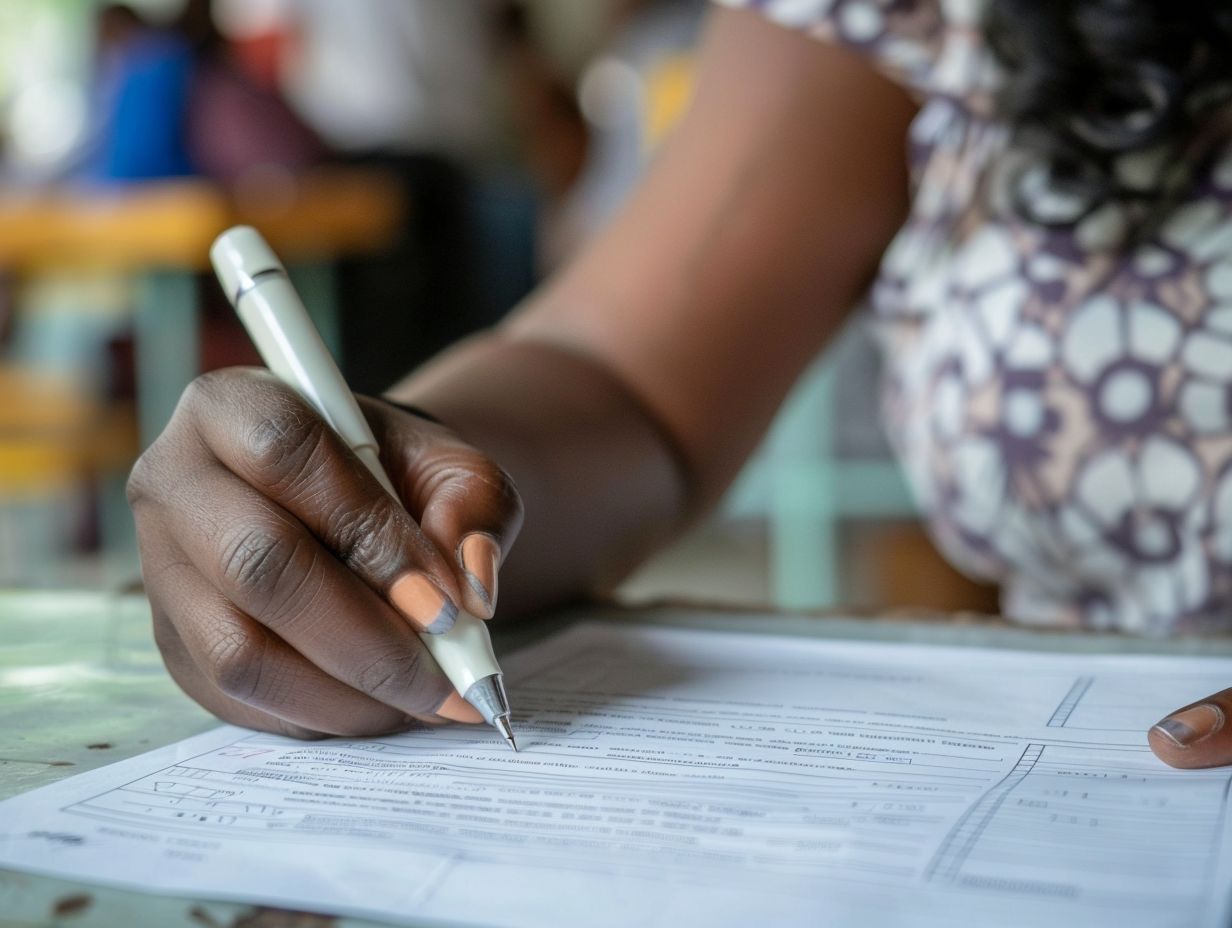Are you considering applying for citizenship in Florida but unsure of the requirements and process?
This article will guide you through the steps needed to become a citizen in the Sunshine State. From eligibility criteria to preparing for the citizenship application process, we will cover everything you need to know. Whether you are a permanent resident looking to naturalize or a newcomer interested in becoming a citizen, this article will help you navigate the path to citizenship in Florida.
Key Takeaways:

- To apply for citizenship in Florida, you must meet eligibility requirements such as being a permanent resident and demonstrating good moral character.
- Preparing for the citizenship application process involves gathering required documents, studying for the test, and attending the interview.
- The process for applying for citizenship includes submitting Form N-400, attending a biometrics appointment, and completing an interview and test.
Who is Eligible for Citizenship in Florida?
In the state of Florida, individuals looking to obtain U.S. Citizenship through naturalization must fulfill specific eligibility requirements established by the U.S. Citizenship and Immigration Services (USCIS). These criteria typically involve meeting residency requirements, undergoing background checks, and demonstrating good moral character.
Residency requirements for naturalization in Florida commonly stipulate that the applicant must have held permanent resident status for a specified period, usually around five years. Immigration Lawyers play a crucial role in assisting applicants with the intricate legal procedures associated with naturalization, ensuring that all necessary documentation is correctly submitted and deadlines are adhered to.
Background checks are carried out to confirm the applicant’s criminal background, if any, and any issues identified during this process could potentially impact the naturalization application.
What are the Requirements for Citizenship in Florida?
The criteria for acquiring U.S. Citizenship in Florida through the naturalization process include essential factors such as:
- Age
- Permanent resident status
- Physical presence
- Good moral character
- Knowledge of English and civics
- Taking the Oath of Allegiance
1. Age
To qualify for naturalization, applicants are required to be a minimum of 18 years old, as specified by the USCIS.
There are specific provisions and unique circumstances for minors. Those under 18 may potentially obtain citizenship through their parents’ naturalization, subject to meeting certain criteria. In these scenarios, the child’s age at the time of the parent’s naturalization can influence their qualification for citizenship.
Age is a critical factor in the naturalization process as it establishes the individual’s legal competence and comprehension of the privileges and duties associated with citizenship.
2. Permanent Resident Status
Individuals seeking naturalization must possess a Green Card and maintain lawful permanent resident status in the United States to meet the eligibility requirements.
Acquiring a Green Card is a critical milestone in attaining permanent resident status in the United States. The Green Card, also known as a Permanent Resident Card, signifies an individual’s authorization to permanently reside and work in the country.
This status affords individuals various benefits, including access to healthcare, educational opportunities, and the ability to sponsor family members for immigration. As a permanent resident, individuals have pathways to potential naturalization, offering the opportunity to become a citizen of the United States and actively engage in civic life.
3. Physical Presence
Physical presence in the United States plays a crucial role in the naturalization process, highlighting the importance of maintaining continuous residency within the country.
Applicants are required to demonstrate that they have maintained physical presence in the U.S. for at least half of the necessary residency period, typically set at five years unless married to a U.S. citizen, in which case it is reduced to three years. This requirement means that being present in the country for more than 6 months out of every year is essential.
Additionally, applicants must avoid any single absence exceeding 12 months during their continuous residency. Supporting evidence such as utility bills, tax returns, and employment records can be utilized to validate this physical presence.
4. Good Moral Character
Candidates must exhibit good moral character to be eligible for naturalization, which encompasses a clean criminal record and adherence to societal norms.
Good moral character is a fundamental requirement for individuals aiming for naturalization, as it mirrors their honesty and reliability as potential citizens. A criminal record can have a significant impact on an individual’s qualification for naturalization, especially if the offenses are grave or show a pattern of disrespect for the law.
To establish their moral integrity, candidates can present character references, participate in community service, and highlight any efforts at rehabilitation made since the incidents in question. By demonstrating consistent adherence to societal norms and laws, candidates bolster their argument for showcasing good moral character.
5. Knowledge of English and Civics
One of the key requirements for naturalization is demonstrating proficiency in English and knowledge of U.S. civics, which is evaluated through a naturalization test conducted by USCIS.
English proficiency is vital due to the importance of effective communication in English for daily interactions in the United States. The naturalization test comprises two main components: an English language test and a civics test. The English section assesses speaking, reading, and writing abilities, while the civics test focuses on essential historical and governmental subjects.
To assist applicants in preparing for these tests, USCIS offers study materials, including practice tests, flashcards, and study guides on the official USCIS website. These resources aim to help individuals enhance their knowledge and confidence before taking the exam.
6. Oath of Allegiance
The final step in the naturalization process is taking the Oath of Allegiance, where applicants pledge their loyalty to the United States, officially becoming U.S. citizens. This ceremony signifies a commitment to upholding the values and principles of the nation. During the ceremony, candidates stand together, reciting the oath with pride and dignity.
By taking this solemn pledge, individuals vow allegiance to the Constitution, committing to defend the rights and freedoms it protects. The Oath of Allegiance is legally binding, requiring new citizens to fulfill their duties and responsibilities while enjoying the privileges of citizenship. It signifies the end of one journey and the start of another, embracing a new identity as an essential part of the American fabric.
How to Prepare for the Citizenship Application Process?
Preparing for the citizenship application process includes:
- Collecting necessary documents
- Studying for the citizenship test
- Participating in an interview, often with the help of Immigration Lawyers to guarantee comprehensive interview readiness
1. Gather Required Documents
Acquiring the necessary documents for a citizenship application involves gathering vital records like a Green Card, Birth Certificate, and any other pertinent documentation as requested by USCIS.
To procure these documents, individuals can begin by obtaining a copy of their Green Card from the United States Citizenship and Immigration Services (USCIS) website or by reaching out to their customer service. Typically, a Birth Certificate can be obtained from the vital records office in the state of birth.
Additional documentation may encompass tax returns, marriage certificates, and proof of residency. These documents play a critical role in verifying identity, legal status, and citizenship eligibility, underscoring the importance of accurately collecting and promptly submitting them.
2. Study for the Citizenship Test
Preparing for the citizenship test is an important part of the naturalization process, requiring applicants to have a good understanding of English and U.S. civics.
To get ready for the test effectively, it is recommended to establish a study schedule that enables coverage of all the essential topics in manageable segments. Online resources such as practice tests, flashcards, and study guides specifically designed for the citizenship exam can be helpful.
The test covers subjects like American history, government structure, and the rights and responsibilities of citizens. Engaging in active learning methods such as self-quizzing, participation in study groups, or teaching concepts to others can help reinforce understanding and retention of the material.
3. Attend the Interview
Participating in the USCIS interview is a crucial step in the naturalization process. During the interview, applicants typically discuss their application and take the citizenship test. Many applicants find it helpful to prepare for the interview with the assistance of Immigration Lawyers.
At the interview, applicants can anticipate questions about their application, personal background, and reasons for seeking citizenship. It is important to thoroughly prepare by reviewing application materials, having a good understanding of U.S. history and government, and practicing potential interview scenarios.
Immigration Lawyers can offer professional support by addressing any uncertainties, conducting mock interviews, and ensuring all required documentation is in order. Adequate preparation not only enhances confidence during the interview but also improves the likelihood of a successful outcome in the naturalization process.
What is the Process for Applying for Citizenship in Florida?
The process of applying for U.S. Citizenship in Florida includes several important steps. These steps typically involve submitting Form N-400, attending a biometrics appointment, participating in a citizenship interview and test, and finally, taking the Oath of Allegiance.
1. Submit Form N-400
The completion of Form N-400, the naturalization application, serves as the initial step in the citizenship application process, necessitating the payment of associated fees to the USCIS. The form mandates applicants to furnish personal information like their full legal name, contact details, date of birth, and lawful permanent resident card number.
Additionally, applicants are required to disclose their travel history, marital status, employment information, and any criminal record.
Once the form is accurately filled out, it should be submitted together with the necessary supporting documents, which may comprise a copy of the green card, passport-style photos, and relevant certificates. The submission process can be conducted online or through traditional mail, and applicants must ensure that the correct fee payment is included, which may vary depending on individual circumstances.
2. Attend Biometrics Appointment
Undergoing a biometrics appointment is a required step in the naturalization process. During this appointment, applicants are asked to provide fingerprints, photographs, and signatures for background checks that are carried out by the FBI.
At the appointment, applicants are guided through a series of procedures to collect these biometric identifiers, which are crucial for verifying their identity.
The data obtained is then forwarded to the FBI for detailed background checks, which include looking into criminal records and any immigration violations. The FBI’s role is vital in cross-referencing this information to ensure that the applicant fulfills the necessary requirements for naturalization.
To get ready for the appointment, applicants are advised to bring essential documents like their appointment notice, valid identification, and any additional forms requested by USCIS.
3. Attend Citizenship Interview and Test
The citizenship interview and test are important processes during which USCIS officers evaluate the applicant’s comprehension of English, knowledge of U.S. civics, and the information provided in their naturalization application.
During the interview, applicants are usually questioned about their background, residency status, and reasons for pursuing U.S. citizenship. The civics test comprises 10 questions picked randomly from a bank of 100 potential inquiries about American history, government, and geography.
To prepare adequately, applicants should study the official list of civics questions given by USCIS and practice responding to them. Understanding the English language requirement is also crucial, as applicants need to exhibit their capacity to speak and comprehend basic English during the interview.
4. Take Oath of Allegiance
Taking the Oath of Allegiance is the final step in becoming a U.S. citizen, marking the culmination of the naturalization process and the beginning of a new chapter as a citizen.
During this significant ceremony, individuals express their commitment to uphold the principles and laws of their new homeland. The Oath signifies a pledge of loyalty to the United States and its Constitution.
The process typically involves a formal ceremony conducted by a judge or official representative, where new citizens gather to recite the Oath together.
This moment is filled with pride, joy, and a sense of belonging for those who have worked hard to achieve this milestone. Following the Oath, new citizens receive their Certificate of Naturalization, symbolizing their official status as U.S. citizens.
What Happens After Becoming a Citizen in Florida?
Upon successfully acquiring U.S. citizenship in Florida, individuals are issued their Certificate of Naturalization, required to update various records and documents, and tasked with commencing the exercise of their rights and responsibilities as naturalized citizens.
1. Receive Certificate of Naturalization
After completing the naturalization process, new citizens are issued their Certificate of Naturalization by USCIS, which acts as evidence of their U.S. citizenship.
This certificate is a crucial document that confirms an individual’s U.S. citizenship status and is necessary for various official purposes like obtaining a passport, voting, and employment verification. Protecting this certificate is important to prevent identity theft and to retain proof of citizenship. It is advised to store the certificate in a secure location, such as a safe deposit box or a home safe.
If the Certificate of Naturalization is lost or damaged, immediate action should be taken to replace it through USCIS by submitting Form N-565.
2. Update Records and Documents
Individuals who have become U.S. citizens are required to update their records and documents with different government agencies to indicate their new citizenship status.
This process typically includes updating key identification documents like Social Security cards, driver’s licenses, and passports. To update Social Security information, individuals can go to their local Social Security Administration office with their naturalization certificate and identification papers.
Regarding driver’s licenses, new citizens must go to the Department of Motor Vehicles to update their license to reflect their citizenship status. Passport updates can be done by submitting the necessary forms and documents to the U.S. Department of State.
It’s important to keep these records current to access various services and benefits effectively.
3. Exercise Your Rights and Responsibilities as a Citizen
New U.S. citizens in Florida are required to fulfill their rights and responsibilities, which include voting in elections, paying taxes, registering for Selective Service if applicable, and participating in jury duty.
These rights and responsibilities are interconnected, serving as the foundation of a well-functioning democratic society. Through active participation in voting, citizens can have a voice in shaping the direction of their country. Paying taxes is vital for the upkeep of public services and infrastructure.
Registering for Selective Service, when necessary, supports national defense initiatives. Serving on a jury is essential for ensuring fair trials and upholding justice. By fulfilling these responsibilities, individuals contribute to the common good and unity of the nation.
Frequently Asked Questions
What is the first step to apply for citizenship in Florida?
The first step to apply for citizenship in Florida is to determine your eligibility. This includes meeting the basic requirements such as being at least 18 years old, having a green card for at least 5 years (or 3 years if married to a US citizen), and having good moral character.
What documents do I need to gather for my citizenship application in Florida?
You will need to gather your green card, social security card, passport, tax returns, and any other relevant documents that prove your eligibility and identity. You may also need to provide evidence of your English language proficiency and knowledge of US civics.
Can I apply for citizenship in Florida if I have a criminal record?
It depends on the severity of the offense and when it occurred. If you have committed a serious crime or have a recent criminal record, it may affect your eligibility for citizenship. It is best to consult with an immigration attorney before applying.
How long does the citizenship application process take in Florida?
The processing time for a citizenship application in Florida can vary, but it typically takes 6-12 months. This timeline may be longer if you need to reschedule your interview or if your application requires further review.
Do I need to take a citizenship test as part of the application process in Florida?
Yes, you will need to take a civics and English language test as part of the citizenship application process in Florida. The test will assess your knowledge of US history and government as well as your ability to read, write, and speak in English.
What happens after I submit my citizenship application in Florida?
After submitting your application, you will receive a notice for your biometrics appointment. This is where you will provide your fingerprints, photograph, and signature. You will then be notified of your interview date, where you will take the citizenship test and have your application reviewed by an immigration officer.


























Rate this article:
Average rating 0 / 5. Vote count: 0
No votes so far! Be the first to rate this post.
No Comments yet!